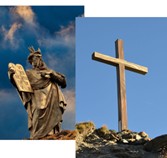
from the Martyrs Mirror
HANS BRAEL SEVERELY PERSECUTED A. D. 1557
I find this story inspiring because the man remembered that God sees everything and allows no temptation above what we are able to bear. He knew that no matter how much he suffered here, his tormentors would be punished by God so much more. His boldness in reproving them to their face for what they were doing to him brought them to face their guilt before God for their actions. ~Clifford Fox
In 1557, Brother Hans Brael was arrested for the faith and testimony of Jesus Christ. About 3-1/2 miles from the castle he met the judge, who rode past him and greeted him without recognizing who he was. Hans was very thankful and relieved. The clerk, however, rode up to him and asked, “Where are you going and what have you been doing here?” He answered “I have been with my brethren.” The clerk asked him if the Baptists were his brethren. “Yes,” he replied.

The clerk then seized him, and the judge turned around, dismounted, and took the brother’s own girdle from his body and bound him with it. Then he made him walk like a dog alongside of his horse, through mud and mire, for a whole league (3-1/2 miles), until they arrived in the castle. He was so fatigued from walking, and from being bound so hard, that he couldn’t stand any longer. He fell down right there in the field, so that even the lord of the castle reproved the judge for having bound him so hard. Then they examined him, taking from him whatever they found on his body, and put him into prison.
The next day he was brought out, and the lord of the castle examined him himself, and asked him about his faith and baptism, and what he thought of the sacrament. When he made confession of his faith in Christ and the divine truth, they pressed him hard to recant. But when he plainly told them that they shouldn’t expect him to renounce the truth he had confessed, they brought him back into prison.
Eight days later, he was brought out again, and the lord with six others examined him; but being unable to accomplish anything, they returned him to prison. After another eight days they brought him into court and examined him before the whole council. The judge called his faith a delusion, and his church a sect. Acts 24:14. But Hans said, “It is neither a sect nor a delusion; but it is the church of God.”
The judge shouted, “It may be the devil’s church, but how could it be God’s church?” and became angry about it. He asked again, “For what reason should it be called the church of God?” But Brother Hans boldly held fast to it, that it was indeed the church of God.
Then the judge said, “Since he knows who has come from the region of Innsbruck, we also want to know where those are who they send out into this country, what their names are, who has fed and harbored them; all this we want to know.”
But Hans answered them, “We are not sent out to the harm or detriment of any one. Our mission is this: we seek the salvation of men and exhort them to repentance and reformation. Matt. 10:5; Acts 2:38. The things that you asked for are not articles of faith, and are not necessary for you to know. That’s why I do not wish to tell them, or accuse any one.”
The judge strongly urged him to spare himself, since his body would be tortured if he refused to name the persons, and to confess who had kept him. Hans asked the judge and the whole council if he could be considered a good person if he betrayed those who had shown him such kindness, by feeding and lodging him. The council members looked at each other, and said that they would not consider it good, if it were done to them. But the judge became enraged, and asked whether he meant to charge the honorable council with requiring treachery of him. He warned him again to spare himself, or they would deal very severely with him. But since he would not confess to them, they returned him to prison, to see what he would decide to do.
After this they brought him out again, and took him to the rack. There he himself took off his clothes, lay down before them, and patiently submitted to the torturing ropes. Even the bystanders could not refrain from weeping. The executioner suspended him by the rope and the judge earnestly admonished him to spare himself, and to indicate the persons required. But Hans said he would betray no one, but would endure whatever God permitted them to inflict upon him. Then they tied a large stone to his feet.

The judge became angry when he saw that he could accomplish nothing. He said, “You swear to each other that you will not betray one another.” Hans replied, “We do not swear, but we do not betray any one, because it would be wrong.” Then the judge said, “You are a scoundrel; I have caught you in a lie.” The brother said, “I am no scoundrel, and in what lie have you caught me?” The judge said, “You said that you were no teacher, but we find that you certainly are one.” He answered, “I am no teacher; but if I were one, I would not be ashamed of it; for it is an honorable thing before God.” I Tim. 3:1.
Then they left him hanging by the rope and went away, but the executioner stayed with him. In the meantime the officers assembled, and he was urged to confess, or they would not stop racking him until they had torn his limbs apart. He replied that he would endure whatever God would allow them to inflict upon him, since they could do no more.
The executioners said, “Aren’t you a fool, to think that God looks down to see what we are doing in this hole? That would be ridiculous.” Then the council returned and said that the lady of the castle had interceded for him, that they should torture him no longer. So they let it rest and they sent him back to prison.
Then the lord had the priests dispute with and examine Hans for two days in succession, namely Saturday and Sunday, he himself being present. But when they could accomplish nothing by their various arguments, and he stood firm in the truth, the lord at last became exasperated with him. Then he said, “O you stubborn dog, I have tried all possible means and ways with you! I will put you on a sharp pile, and see how you will trust your God in this trial.” But he answered, “I will not suffer because of any wrongdoing, but only for the truth and the faith; and God will overlook no wrong.”
After three days they put him into a deep, dark and filthy tower, where he couldn’t see sun or moon, or daylight. He could not tell if it was day or night, except by the temperature. It was also so moist and damp in the tower that his clothes rotted on his body. He became almost naked, and was without a single garment for a long time, except for a coarse blanket that had been given him, which he wrapped around his body and thus sat in misery and darkness. The shirt on his body had so rotted, that he had not a shred left of it, except the collar, which he hung on the wall.
Once they brought him out to see if he would apostatize, but the light hurt his eyes so much that he was glad when they returned him to the dark tower. There was also such a foul stench from the filth that was in this dark hole, that no one could stay in his presence. When they brought him in, they instantly had to go away from him again. Even the councilors said that they had never smelled such a horrible stench.
Thus he lay in this filthy tower, in which were also many vermin and disgusting reptiles. The tower had not had an occupant for a long time and so the vermin were very numerous, and they caused him much terror until he got used to it. The vermin sometimes also ate his food, so that when they let down his food, he had to eat it all up before he set down the dish; otherwise the vermin so covered it that he could not eat it. When he got a dish of soup, and set it down but once, they ate it up. In short, he couldn’t keep bread or anything else. As soon as the vermin smelled it, they were at it. However, this was his smallest problem, because he was so hungry. They never gave him much, so he could always eat it right away unless he was sick. The vermin sometimes also got in his drink, and drowned in it, until he finally found a large stone, which he put on top of his pitcher.
His biggest hardship, however, was that he could get no news from the church or the brothers. At that time Hans Mein, a servant of the Lord, also had a great desire to hear from him. He sent word to him in the tower, asking if it was still well with him. If his heart held firmly to God and his church, he should send him a token. If he had nothing else, he should send him a little bit of straw, however little it might be. But such was the misery and poverty in which he sat that he could not even find that much in the tower. Then he thought of his rotten collar which he had hung on the wall. He took the collar and sent it from the tower to his brother, as a token that he was still unchanged in his faith in God, and in peace with the church.
When the brother received the collar and realized his misery and poverty, he and his church felt great compassion for him. After weeping sorrowfully, they sent word back to him, that they were very willing to send him clothes or anything else, if he only could get it. But he would not have it, because that if they had discovered it, they would have thrown him on the rack and tortured him again to get the names of others. So he sent them word that he would let the garment of patience be sufficient for him.
Thus he lay in this filthy tower all summer, until autumn, when they saw that the frost was approaching. Then they took him out and put him into another prison, which could likewise not have been worse. There he had to sit with one hand and one foot in the stocks for thirty seven weeks, being unable to lie or sit properly, but only to stand. Besides, he had to endure much ridicule from the ungodly. They said, “There lies a holy man; nobody is as wise as he is; there he sits as a light of the world, and as a witness of the people of God and His church,” etc.
Again, since he couldn’t get news from the church, God allowed him to be comforted by the unbelievers. One time a nobleman came to comfort him, telling him to be courageous, and not to be intimidated since he knew that he had the truth on his side, and that his faith was the true one. However, he felt that it was impossible to follow it or to suffer what Hans suffered.
One time it also happened that his soul was kindled in God, and he sent for the clerk who had apprehended him, so that he would come to him in prison. The clerk quickly came to him, sat down, and asked him what he wanted, that he had sent for him.
The brother said, “The sole reason is that I cannot help reminding you of this one fact. As you well know, you are the chief cause of my imprisonment and miserable sufferings, though I have never in all my life done you an injury.”
The clerk sat there frightened and dumb, not saying a word, except that he had to do it.
The brother said: “Yes, the judgment of God impelled you to it because you were so bloodthirsty against the devout. It also fell to your lot to fulfill your judgment by this means. You have incurred a heavy judgment; God will certainly find you for this, require it at your hands, and punish you for your sins.”
The clerk was dumbfounded and could not utter a word. He went away very frightened. About two weeks later he died very suddenly in the night, being healthy and dead within a quarter of an hour. God had smitten him with great fear; so that he cried and moaned terribly, and lamented that he had done wrong and sinned.
So it goes with those who will serve the devil and his followers. He was also severely scolded for this by his master and his mistress, and reaped the devil’s thanks for it from his own. They said to him, so loud that the brother heard it himself, “How did the devil come to possess you that you would not let this man go, though you might easily have done so?” They wished that the devil rather had carried him off, since he had done this, for which he had to pay so dearly at his end.
In the same night that the clerk died, a great joy came over Hans, so that with praying and thanksgiving he could not praise God sufficiently; for on that night it was revealed to him that he would yet return to the brethren and the church. In the morning a servant came to him, and told him, that the clerk had died very terribly and suddenly during the night. Ps. 73:18. When this happened with the clerk, the lord and his spouse were seized with great terror.
About eight days afterwards, the servant who attended to the farming of the land came into the castle, and came to the brother with the keys, and asked whether he hoped to get out. Hans replied, “I will see what you will do for me.” The servant wanted to open the stocks, but could not find the right key. The brother told him not to do it, since it might get him in trouble. When he could not find the right key, the servant told him that he could set him free, but probably not at that time.

“Promise that you will allow yourself to be instructed, and confess that you have erred and you will be set at liberty. The lady of the castle will take upon herself the sin which you commit by it . . .” But Hans replied, “She has enough sins already, let her repent of them.” So he had to lie in prison and sorrow for another winter.
The lady of the castle also sent a servant to the prison who said, “The gracious lady would have me tell you that she will send for the judge and the priest, if you will say two things. Promise that you will allow yourself to be instructed, and confess that you have erred and you will be set at liberty. She will take upon herself the sin which you commit by it, so that no guilt will fall upon you.”
But Hans replied, “She has enough sins already, let her repent of them. She needs no sins from others.” I Tim. 5:22. So he had to lie in prison and sorrow for another winter.
Then an order came from Innsbruck, from the council, which the lords came to read to him. It contained the following: Since he was so obstinate, and would receive no instruction, he should be sent to sea. He would go there the next morning. There he would find out how evildoers are stripped and scourged. But Hans replied that he would trust in God his Lord, who was on sea as well as on the land, to help him and give him patience. II Cor. 1:9; Matt. 14:31.
They then let him out of prison to walk around in the castle for two days, so that he could learn to walk again. He was not able to walk because of having been in imprisonment, stocks, fetters and bonds for nearly two years. He had not seen the sun for about a year and a half.
He was then given in the custody of one of the servants, who was to take him to the sea. So he took leave from everyone in the castle and exhorted them to repentance. The lady of the castle sent word to him that he should come to her, which he did. She called him into her study, where he exhorted her also to repentance, and asked her not to molest the pious (who do no hurt, in the exercise of their religion) and not to apprehend any more of them. To this she consented and began to weep, so that the tears flowed down her cheeks, and said, “I will never lay hands on them again in my life.” She gave him some money for the journey, and dismissed him.
This servant then took him away with him. The servant was a wicked man; he called the brother a scoundrel on every occasion, or applied some other shameful nickname to him.
After two days, the servant drank so much wine in a tavern, (for those present had so often drunk to his health), that he didn’t go to bed to sleep. Instead he stretched himself on the table and instantly fell asleep like a dumb beast and rolled off the table.
Seeing this, the brother opened the door of the room and also the door of the house and locked them again, and went away.
So God helped him to make his escape that night, which took place in the year 1559. So he returned in peace and with joy to the church of the Lord, his brethren. Subsequently he again went up into the country, several times, as the ministry of the divine Word had been committed to him.

From this it may be seen how God helps His own children. We also see how He can give much strength and patience in suffering to those who cleave to Him with a true heart, through their strong faith, which would otherwise be impossible. II Tim. 4:17; Philip. 4:13; Matt. 17:20.
And it is also seen how He casts out His enemies and adversaries, and knows where to find them. Not only did the clerk die a very dreadful death; but, while Hans Brael yet lay in prison, the lord of the castle died suddenly. The servant who was to take Hans to the sea also died miserably, even before the brother left the country. About two years afterwards the judge died a most miserable death too.
This article was originally published on The Heartbeat of the Remnant Magazine.
Issue: APRIL/MAY/JUNE 2008







